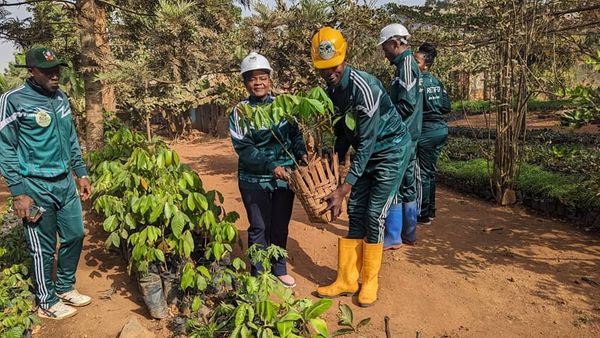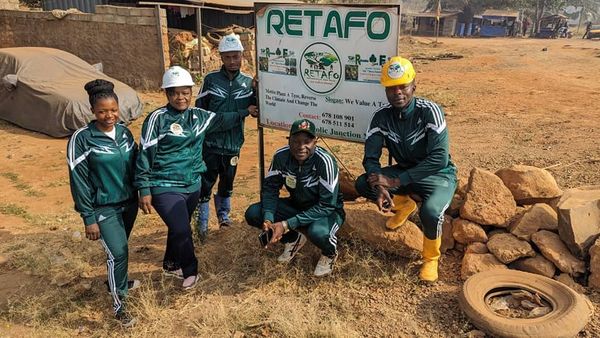Exploring Sustainable Reforestation
Here at ReTaFo, we believe in the power of collaboration to achieve impactful environmental change. Recently, we were honored to welcome a distinguished doctor of biodiversity and conservation from the esteemed University of Bamenda. This wasn’t just a courtesy visit; it was a chance to showcase our commitment to sustainable reforestation, forge a valuable partnership, and delve deeper into the fascinating world of the Cannarium plant (also known as the black tree).

Building Bridges for a Greener Future
Our esteemed guest from the University of Bamenda represents a leading institution dedicated to environmental research and education in Cameroon. This visit served as a bridge between academic expertise and on-the-ground action. Through open discussions and a tour of our thriving plantations, we fostered a collaborative environment to explore effective strategies for sustainable reforestation.
This collaboration isn’t just about exchanging knowledge. It paves the way for future joint projects, research initiatives, and student volunteer programs. By working hand-in-hand with academic institutions, ReTaFo can leverage cutting-edge scientific knowledge while providing valuable practical experience for future generations of environmental stewards.
The Cannarium Plant: A Keystone of the Cameroonian Ecosystem

One of the highlights of the visit was exploring our 2-hectare plantation dedicated to cultivating the Cannarium schweinfurthii, or black tree. This majestic native species plays a critical role in the ecological tapestry of Cameroon.
Here’s a deeper dive into the fascinating world of the Cannarium plant:
- Ecological Significance:
- The Cannarium tree provides crucial habitat for a diverse range of animals, including birds, insects, and small mammals.
- Its expansive root system helps prevent soil erosion and maintains healthy soil structure, vital for preventing landslides and promoting healthy plant growth throughout the ecosystem.
- The Cannarium contributes to nutrient cycling, replenishing the soil with essential minerals and ensuring plant communities thrive.
- Economic Potential:
- The black tree produces edible nuts that are a valuable source of income for local communities. These nuts are a rich source of protein, healthy fats, and essential vitamins.
- The sustainable harvesting and processing of Cannarium nuts can empower local communities and contribute to economic development in rural areas.
- By promoting the sustainable cultivation and utilization of Cannarium, ReTaFo aims to create a win-win situation for both the environment and local livelihoods.
Exploring Sustainable Reforestation Techniques
The visit from the University of Bamenda representative provided a valuable opportunity to discuss and showcase ReTaFo’s approach to sustainable reforestation. Here are some key aspects of our practices:
- Native Species Selection: We prioritize planting native trees like the Cannarium, ensuring they flourish in the local climate and support existing ecological relationships.
- Direct Seeding and Seedling Propagation: We employ a combination of direct seeding and nursery-raised seedling planting depending on the specific species and site conditions.
- Community Involvement: We actively engage local communities in the reforestation process, fostering a sense of ownership and ensuring long-term sustainability.
- Monitoring and Evaluation: We regularly monitor the health and growth of our plantations, adapting our methods based on data and observations.
By utilizing these techniques and collaborating with institutions like the University of Bamenda, ReTaFo aspires to achieve the following goals:
- Restoration of Degraded Land: We aim to restore degraded landscapes, promoting biodiversity, mitigating climate change, and improving soil health.
- Conservation of Biodiversity: By focusing on native species like the Cannarium, we contribute to the conservation of Cameroon’s rich biodiversity.
- Empowerment of Local Communities: Through sustainable reforestation practices, we aim to empower local communities by providing economic opportunities and fostering a connection to the land.
A Call to Action: Partnering for a Thriving Future
The visit from the University of Bamenda was a testament to the power of collaboration. We believe that by forging partnerships with academic institutions, local communities, and other stakeholders, we can achieve a significant impact on the environmental landscape of Cameroon.
Here’s how you can get involved:
- Support ReTaFo: Consider donating or volunteering to support our ongoing efforts in sustainable reforestation.
- Spread Awareness: Educate your friends and family about the importance of reforestation and the unique ecological value of the Cannarium plant.
- Advocate for Change: Urge policymakers to prioritize sustainable forestry practices and support local communities engaged in environmental conservation.
Together, we can create a greener, more prosperous future for Cameroon and the planet. By combining scientific knowledge with practical action, fostering a spirit of collaboration, and empowering local communities, we can ensure the continued health and vitality of our ecosystems for generations to come.

